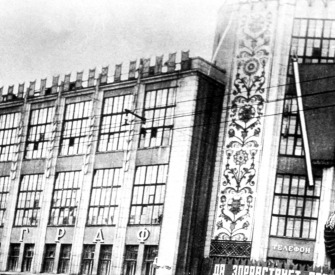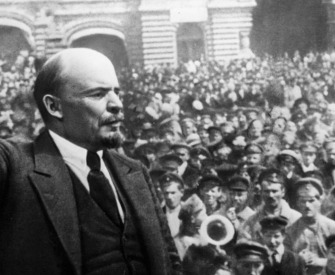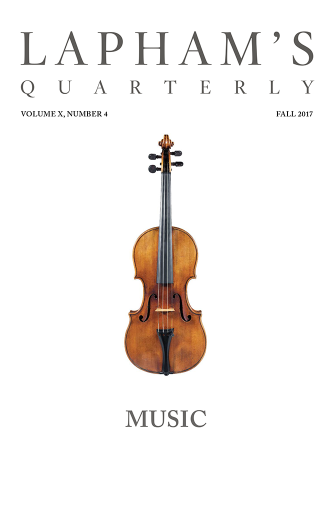If the world were good for nothing else, it is a fine subject for speculation.
—William Hazlitt, 1823Not by Liberty but by Fear
“They do not believe in God, they do not go to church, they dress poorly, but they are civil in their manners.”
Every morning, warmly and comfortably dressed, with a box of small wares on his breast, Yevsey Klimkov went to receive orders either at one of the cafes where the spies gathered, or at a police office, or at the lodging of one of the spies. The directions given him were simple and distinct.
“Go to such and such a house. Get acquainted with the servants. Find out how the masters live.”
If he succeeded in penetrating to the kitchen of the given house, he would first try to bribe the servants by the cheap price of the goods and by little presents. Then he would carefully question them about what he had been ordered to learn. When he felt that the information gathered was insufficient, he filled up the deficiency from his own head, thinking it out according to the plan drafted for him by the old, fat, and sensual Solovyov.
“These men in whom we are interested,” Solovyov once said in a smug, honey-sweet voice, “all have the same habits. They do not believe in God, they do not go to church, they dress poorly, but they are civil in their manners. They read many books, sit up late at night, often have gatherings of guests in their lodgings, but drink very little wine, and do not play cards. They speak about foreign countries, about systems of government, workingmen’s socialism and full liberty for the people. Also about the poor masses, declaring it is necessary to stir them up to revolt against our tsar, to kill out the entire administration, take possession of the highest offices, and by means of socialism again introduce serfdom, in which they will have complete liberty.” The warm voice of the spy broke off. He coughed and heaved a sentimental sigh. “Liberty—everybody likes and wants to have liberty. But if you give me liberty, maybe I’ll become the first villain in the world. That’s it. It is impossible to give even a child full liberty. The Church Fathers, God’s saints, even they were subject to temptations of the flesh, and they sinned in the very highest. People’s lives are held together, not by liberty but by fear. Submission to law is essential to man. But the revolutionists reject law. They form two parties. One wants to make quick work with the ministers and the faithful subjects of the tsar by means of bombs, etc. The other party is willing to wait a little; first they’ll have a general uprising, then they’ll kill off everybody at once.” Solovyov raised his eyes pensively, and paused an instant. “It is difficult for us to comprehend their politics. Maybe they really understand something. But for us everything they propose is an obnoxious delusion. We fulfill the will of the tsar, the anointed sovereign of God. And he is responsible for us before God, so we ought to do what he bids us. In order to gain the confidence of the revolutionists you must complain, ‘Life is very hard for the poor, the police insult them, and there’s no sort of law.’ Although they are people of villainous intent, yet they are credulous, and you can always catch them with that bait. Behave cannily toward their servants; for their servants aren’t stupid, either. Whenever necessary, reduce the price of your goods, so that they will get used to you and value you. But guard against exciting suspicion. They will begin to think, ‘What is it? He sells very cheap, and asks prying questions.’ The best thing for you to do is to strike up friendships. Take a little dainty, hot, full-breasted thing, and you’ll get all sorts of good information from her. She will sew shirts for you, and invite you to spend the night with her, and she will find out whatever you order her to. You know—a tiny, soft little mouse. You can stretch your arm a long distance through a woman.”

Radical Parliament!, by George Cruikshank, 1820. © Eileen Tweedy / The Art Archive at Art Resource, NY.
This round man, hairy-handed, thick-lipped, and pockmarked, spoke about women more frequently than the others. He would lower his soft voice to a whisper, his neck would perspire, his feet would shuffle uneasily, and his eyes, minus eyebrows and eyelashes, would fill with warm, oily moisture. Yevsey with his sharp scent observed that Solovyov always smelled of hot, greasy, decayed meat.
In the chancery the spies had been spoken of as people who know everything, hold everything in their hands, and have friends and helpers everywhere. Though they could seize all the dangerous people at once, they were not doing so simply because they did not wish to deprive themselves of a position. On entering the Department of Safety everyone swore an oath to pity nobody, neither father, mother, nor brother, nor to speak a word to one another about the sacred and awful business that they vowed they would serve all their lives.
Consequently Yevsey had expected to find sullen personalities. He had pictured them as speaking little in words unintelligible to simple people, as possessing the miraculous perspicacity of a sorcerer, able to read a man’s thoughts and divine all the secrets of his life.
Now from his sharp observation of them he clearly saw they were not unusual, nor for him either worse or more dangerous than others. In fact, they seemed to live in a more comradely fashion than was common. They frankly spoke of their mistakes and failures, even laughed over them. All without exception were equally fervent in swearing at their superiors, though with varying degrees of malice.
Conscious of a close bond uniting them, they were solicitous for one another. When it happened that someone was late for a meeting or failed to appear at all, there was a general sense of uneasiness about the absentee, and Yevsey or someone of the numerous group of “novices” or “assistants” was sent to look for the lost man at another gathering place.
A stranger observing them would have been instantly struck by the lack of greed for money among the majority and the readiness to share money with comrades who had gambled it away or squandered it in some other fashion. They all loved games of hazard, took a childish interest in card tricks, and envied the cleverness of the card sharp.
They spoke to one another with ecstasy and acute envy of the revelries of the officials, described in detail the bodies of the lewd women known to them, and hotly discussed the various processes of the sexual relation. Most of them were unmarried, almost all were young, and for every one of them a woman was something in the nature of whiskey—to give him ease and lull him to sleep. Women brought them relief from the anxiety of their dog’s work. Almost all kept indecent photographs in their pockets, and looked at them with greed while talking obscenities. Such discussion roused in Yevsey a sharp, intoxicating curiosity, sometimes incredulity and nausea. He soon came to know that some of the spies practiced pederasty and sodomy, and that very many were infected with secret diseases. All of them drank much, mixing wine with beer, and beer with cognac, in an effort to get drunk as quickly as possible.
Only a few of them put hot enthusiasm, the passion of the hunter, into their work. These boasted of their skill, swelling with pride as they described themselves as heroes. The majority, however, did their work wearily, with an air of being bored.
Among the youth the most noticeable was Yakov Zarubin, who was constantly fidgeting about and constantly running up to the others with questions. When he listened to the conversations about the revolutionists he knitted his brows in anger and jotted down notes in his little notebook. He tried to be of service to all the important spies, though it was evident that no one liked him and that his book was regarded with suspicion.
The larger number spoke indifferently about the revolutionists, sometimes denouncing them as incomprehensible men of whom they were sick, sometimes referring to them in fun as to amusing cranks. Occasionally, too, they spoke in anger as one speaks of a child who deserves punishment for impudence. Yevsey began to imagine that all the revolutionists were empty people who were not serious, and did not themselves know what they wanted, but merely brought disturbance and disorder into life.
Matters of business were discussed in a lazy, unwilling way, and “You don’t understand anything, brother,” was a common rejoinder of one spy to another.
“And you?” would be the counter-retort.
“I keep quiet.”
The spies treated Klimkov good-naturedly, and their occasional laughter at his expense did not offend him, for when he was grieved over his mistakes, they comforted him:
“You’ll get used to the work.”
He was puzzled as to when the spies did their work, and tried to unriddle the problem. They seemed to pass the greater part of their time in the cafes, sending novices and such insignificant fellows as himself out for observations.
He knew that besides all the spies with whom he was acquainted there were still others, desperate, fearless men, who mingled with the revolutionists, and were known by the name of provocateurs. There were only a few such men, but these few did most of the work, and directed it entirely. The authorities prized them very highly, while the street spies, envious of them, were unanimous in their dislike of the provocateurs because of their haughtiness.

Bocca di leone (lion’s mouth) mailbox for secret denunciations, Doge’s Palace, Venice. © Omniphoto / UIG / Bridgeman Images.
Once in the street Grokhotov, a fellow spy, pointed out a provocateur to Yevsey.
“Look, Klimkov, quick!”
A tall, sturdy man was walking along the pavement. His fair hair combed back fell down beautifully from under his hat to his shoulders. His face was large and handsome, his mustache luxuriant. His soberly clad person produced the impression of that of an important, well-fed gentleman of the nobility.
“You see what a fellow?” said Grokhotov with pride. “Fine, isn’t he? Our guard. He delivered up twenty men of the bomb. He helped them make the bombs himself. They wanted to blow up a minister. He taught them, then delivered them up. Clever piece of business, wasn’t it?”
“Yes,” said Yevsey, amazed at the man’s stately appearance so unlike that of the busy, bustling street spies.
“That’s the kind they are, the real ones,” said Grokhotov. “Why, he would do for a minister; he has the face and figure for it. And we—what are we? Poverty-stricken dependents upon a hungry nobleman.”
Yevsey sighed. The magnificent spy aroused his envy.
Ready to serve anybody and everybody for a good look or a kind word, he ran about the city obediently, searched, questioned, and informed. If he succeeded in pleasing, he rejoiced sincerely, and grew in his own estimation. He worked much, made himself very tired, and had no time to think.
The days passed quickly, in a constant stir, one just like the other. At times Yevsey felt they would file on in the same way far into the future—varicolored, boisterous, filled with the talks now become familiar to him and with the running about to which he had already grown accustomed. This thought enfolded his heart in cold tedium, his body in enfeebling languor. Everything within and without became empty. Klimkov seemed to be sliding down into a bottomless pit.

Maxim Gorky
From The Spy: The Story of a Superfluous Man. Born Aleksey Peshkov, the author was beaten by many of his childhood employers; his experiences led him to change his name to Gorky, meaning “bitter.” From 1906 to 1913, Gorky lived in self-imposed political exile in Italy; after the Russian Revolution he quarreled with the Bolsheviks and was sent into a second exile by Lenin in 1921. Gorky returned to Russia in 1928 and died there in 1936. His brain was surgically removed and stored at Moscow’s Brain Institute.


